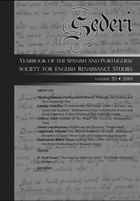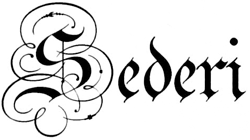
Sederi 20
Sederi 20 — 2010
EDITORS
Berta Cano Echevarría & Ana Sáez-Hidalgo
REVIEW EDITOR
Francisco José Borge López
ISSN 1135-7789
Carmen Font Paz, “‘I have written the things which I did hear, see, tasted and HANDLED’: Selfhood and Voice in Katherine Evans’ and Sarah Cheevers’ A Short Relation of Their Sufferings (1662).” SEDERI 20 (2010): 27-56.
DOI: https://doi.org/10.34136/sederi.2010.2 Download PDF
Abstract
This article analyses the representation of selfhood in a major Quaker autobiography, A Short Relation (1662), written by Katharine Evans and Sarah Cheevers; the analysis will try to assess, through a detailed discussion of the voices in the text, the dynamic female selfhood that emerges from it and its main constitutive elements. Secondly, and with the help of Evans’ and Cheevers’ private correspondence, the article contextualises this notion of selfhood in the social space of early Quakerism in order to assess the extent to which it was informed by the Quaker emphasis on gender equality before God and women’s relationship to the divine. At the same time, this analysis invites us to regard A Short Relation as a major early modern autobiography that may be particularly challenging to present-day Gender Studies.
Keywords: Quakerism; early modern women writing; autobiography; gender; prophetic writing.
References
Bakhtin, Mikhail 2006 (1981). “From the Prehistory of Novelistic Discourse.” Ed. Michael Holquist. The Dialogic Imagination, Four Essays. Austin: University of Texas Press: 40-81.
Berg, Christina and Phillipa Berry 1981. “Spiritual Whoredom: An Essay on Female Prophets in the Seventeenth Century.” Ed. Francis Baker. 1642: Literature and Power in the Seventeenth Century. Colchester: University of Essex Press: 39-54.
Besse, Joseph and Michael Gandy eds. 2003. Sufferings of Early Quakers: Ireland, Scotland and Wales Including Monmouthshire and Shropshire 1653-1691 Vol 5. London, Sessions Book Trust (facsimile edition).
Biddle, Hester 1660. A Warning from the Lord God. London: Robert Wilson.
Clarke, Danielle 2000. “Introduction.” Eds. Danielle Clarke and Elizabeth Clarke. ‘This Double Voice’: Gendered Writing in Early Modern England. London: Macmillan Press: 1-15.
Coles, Kimberly Anne 2008. Religion, Reform, and Women’s Writing in Early Modern England. London: Cambridge University Press.
Crawford, Patricia 1993. Women and Religion in England 1500-1720. London: Routledge.
Evans, Katharine and Sarah Cheevers 2001 (1662). This is a Short Relation of some of the Cruel Sufferings (for the Truths Sake) of Katharine Evans & Sarah Cheevers in the Inquisition in the Isle of Malta. London: Robert Wilson. Facsimile edition: The Early Modern Englishwoman: A Facsimile Library of Essential Works. Eds. Betty S. Travitsky and Patrick Cullen Series II, Printed Writings, 1641-1700: Part I, Vol. I, Life Writings I. Aldershot: Ashgate.
Evans, Katharine and Sarah Cheevers (1663). A True Account of the Sufferings of Katherine Evans and Sarah Cheevers. (London: Robert Wilson). Facsimile edition in Early English Books Online http://eebo.chadwyck.com/home. Copy from Haveford College Library, wing 2220:03).
Fell, Margaret 1660. A Declaration and an Information from us the People of God Called Quakers. London: Thos. Simmons & Robt. Wilson.
Feroli, Teresa 2006. Political Speaking Justified: Women Prophets and the English Revolution. Newark: University of Delaware Press.
Gill, Catie 2005. Women in the Seventeenth-century Quaker Community: A Literary Study of Political Identities, 1650-1700. London: Ashgate Publishers.
Gill, Catie 2009. “Evans and Cheevers’s A Short Relation in Context: Flesh, Spirit, and Authority in Quaker Prison Writings, 1650-1662.” Huntington Library Quarterly 72/2: 257-272.
Graham, Elspeth 1989. Her Own Life: Autobiographical Writings by Seventeenth-Century Englishwomen. Eds. Hilary Hinds, Elaine Hobby, and Helen Wilcox. London: Routledge.
Gillespie, Katharine 2004. Domesticity and Dissent in the Seventeenth Century: English Women’s Writing and the Public Sphere. Cambridge: Cambridge University Press.
Gray, Catharine 2007. Women Writers and Public Debate in 17th-Century Britain. New York: Palgrave.
Hinds, Hilary 1996. God’s Englishwomen: Seventeenth-century Radical Sectarian Writing and Feminist Criticism. Manchester: Manchester University Press.
Hobby, Elaine 2002. “Prophecy.” Ed. A. Pacheco. A Companion to Early Modern Women’s Writing. Oxford: Blackwell Publishers: 264-282.
Holquist, Michael 2005. Dialogism. London: Routledge.
Knott, John Ray 1993. Discourses of martyrdom in English literature, 1563-1694. Cambridge: Cambridge University Press.
Longfellow, Erica 2004. Women and Religious Writing in Early Modern England. London: Cambridge University Press.
Malcomson, Cristina and Miholo Suzuki 2002. Debating Gender in Early Modern England 1500-1700. New York: Palgrave.
Mack, Phyllis 1992. Visionary Women: Ecstatic Prophecy in Seventeenth-Century England. California: University of California Press.
Punshon, John 2006 (1984). Portrait in Grey: a Short History of the Quakers. London: Quaker Books.
Purkiss, Diane 1992. “Producing the Voice, Consuming the Body: Women Prophets of the Seventeenth Century.” Eds. Isobel Grundy and Susan Wiseman. Women, Writing, History 1640-1740. London: Batsford: 139-158.
Trill, Suzanne, Kate Chedgzov, and Melanie Osborne, eds. 1997. Lay by your Needles, Ladies, Take the Pen: Writing Women in England 1500-1700. New York: Hodder Arnold.
Wiseman, Susan 1992. “Unsilent instruments and the devil’s cushions: authority in seventeenth-century women’s prophetic discourse.” Ed. Isobel Armstrong. New Feminist Discourses. London: Routledge: 176-196.
